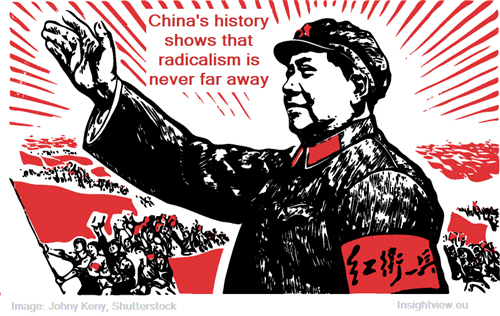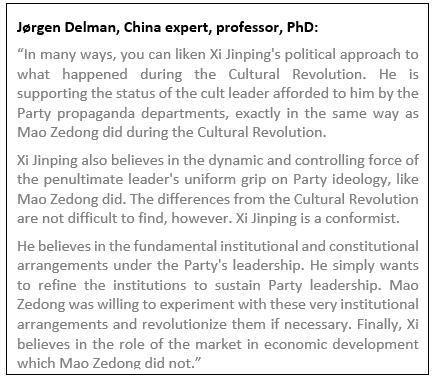Today, according to this website, China faces what can only be described as a cultural and economic revolution, which could potentially roll back the country many years. The "core leader", President
Xi Jinping, has surprised everyone in China and abroad by reversing many of the economic reforms launched in the last three decades. Today, Beijing appears to be on a path of changing everything. The Chinese President intends to confront "moral decadence" in the name of "real socialism", which aims to optimise the "best for the community" rather than for the “individual”.
The Communist Party finally walks the talk. The fact that Beijing and
Xi Jinping have turned totalitarian is not a surprise, which was also outlined by this website in the
Travel Notes from April 2019. [Read the Insightview article,
Unplugged 'Travel Notes': President Xi Jinping moves backwards as the Chinese people moves forwards.] However, this time, there is more convincing evidence that President
Xi Jinping is committed to rectifying policy “mistakes” made in the past. The current campaign is in sharp contrast to Mr Xi’s predecessors’ policy of “Communism with Chinese characteristics”, which was a misleading trade description. The real “description of content” was a mix of private capitalism, state capitalism, and more room for individualism.

Today’s campaign is a multidimensional strategy. First, Beijing uses the goal of “
dual circulation” to make China more independent of foreign markets. Second, President Xi’s “noble goal” of raising the level of “
common prosperity” aims to eliminate social inequality, which sees the support of the majority of the Chinese. For instance, the tools are to target excessive profits in the private sector and create the foundation for a fair income and wealth distribution.
Rectification and Western decadence
Nevertheless, it is difficult for Beijing to hide the fact that the main aim is to strengthen the power of the Communist Party. Beijing has done nothing to hide this ambition. Last week, an unknown blogger, “Li Guangman”, wrote that “
revolution is in the air in China, with profound transformations to be felt”. [the
English translation is available on the website of China Digital Times.] The blog post with the headline, “Everyone can sense that a profound change is underway,” has been published on many official media linked to the Communist Party. Furthermore, the authorities have done nothing to tone down the discussions on social media platforms related to the blog post.
Insightview does not hesitate to call the current trend a “cultural and economic revolution”, which will have far-reaching consequences in China and abroad. Indeed, it seems that today is the time of rectification with “some reminiscence” of the Cultural Revolution from 1966 to 1976. This is also a view partially shared by
Jørgen Delman, a China expert, although he stresses that Mr Xi is a believer in the role of the market forces. [Read more in the text insert below.] However, the jury is still out, as
Xi Jinping has shown several times that market forces are only acceptable “if they move in the right direction”. On the other hand, this is no different from the policy stance in the United States and Europe, where policymakers started abandoning market forces more than a decade ago.

Nonetheless, such a “revolution” requires “re-education” of the Chinese people after years of allowing them to pursue their individual dreams. Therefore, Beijing is now targeting the educational establishment, the tech sector, the entertainment sector and, of course, the media. Furthermore, the “thoughts of
Xi Jinping” have become a more significant part of the curriculum at all levels. [Read the BBC article,
China schools: 'Xi Jinping Thought' introduced into the curriculum.]
It does not stop here. This is also a cultural revolution requiring all aspects of life to join the bandwagon. This applies to artists and actors. [Read the Reuters article,
China cracks down on showbiz for 'polluting' society and youth.] This also applies to social media influencers or people who dare to be different. Indeed, the “campaign” to make everybody “come back in line” could hit arbitrarily. [Read also the SCMP article,
Chinese university appears to ask for lists of LGBTQ students for 'investigation'.] Today, nobody is safe. This applies to ordinary people’s new working attitude, ”
lying flat”, or their behaviour on social media. [Read the Sixtone article,
China’s Ongoing Struggle Against ‘Sissy’ Young Men.] Also, celebrities or actors are at risk if “they do not behave as they are supposed to”. [Read the Reuters article,
China cracks down on showbiz for 'polluting' society and youth.]
The risk of radicalism
Not surprisingly, Beijing’s priority of “
common prosperity” rather than boosting “individual wealth” has started a witch-hunt on “personal gains” and individualism, not least on social media. In this context, it is no surprise that many
super-rich Chinese are now in a hurry to give away part of their wealth before Beijing decides to “redistribute” their money – or the Communist Party allows the masses to “rectify imbalances”. [Read the Fortune article,
Beijing reveals its next target for regulation: ‘excessive’ incomes.]
In Europe and the United States, China pundits and political leaders have underestimated the possibility that
Xi Jinping could replace empty political phrases with action one day. At first glance, the response among politicians and the media in Europe and the United States has been resentment. The fact is, however, that many of Beijing’s new policy objectives could easily find “populist support” on the far right or the far left in the West - or poor countries with a high degree of income and wealth inequality.
Interestingly, President Xi’s campaign sees popular domestic support in the same way as his anti-corruption campaign did a few years ago. According to many Chinese, the goal of closing the income and wealth gap is long overdue. The same applies when it comes to making medical care, housing, and education affordable for everyone. However, the risk is that all of China could lose big time if the “campaign” runs out of control.
Chinese state media has said that “we won't kill the rich to help the poor”. Nonetheless, this does not change the fact that Beijing’s campaign risks endangering “entrepreneurship”. China’s history shows that radicalism is never far away, not least if Beijing opts for a “Maoist-styled” movement rather than orderly legislation in the form of higher taxes on income and wealth. A few courageous voices have opposed the new policy in China, although they are soon expected to be silenced. Last week, Zhang Weiying, an economics professor at Peking University, warned about the risk of derailing the economy and creating “common poverty” by targeting rich people and entrepreneurs. [Read the Bloomberg article,
China Economist Is Rare Voice of Caution on ‘Common Prosperity’.]
Beijing walking the talk is a warning to the West
The rest of the world should note that President
Xi Jinping walks the talk. In contrast to the Chinese, who are used to adapt to mood swings within the political leadership in Beijing, the rest of the world is unprepared. The consequences could be far-reaching, as the world is excessively dependent on the
Chinese economy, which has become evident during the pandemic.
In the past, many international investors and companies have seen a “little noise” in Beijing as an opportunity to enter the
Chinese economy. Until recently, foreign politicians, domestic, and foreign companies bet on the assumption that
Xi Jinping’s corporate-hostile and assertive foreign policy rhetoric is no more than “short-term noise”. The typical reaction is that President
Xi Jinping will never give up China’s economic achievement by going back to “real socialism”. The latest development shows that such an assumption could prove dangerous. At present, there are no signs that President Xi has slowed the “rectification campaign”. Instead, the “Maoist U-turn” has gained momentum.
In Beijing, this has been made easier because the Western model of capitalism and liberalism has failed, according to Chinese policymakers, ordinary Chinese households – and probably also according to many European and US voters. President
Xi Jinping has launched a sweeping rollback of the reforms in the name of socialism, which aims to refocus policymaking on “people” rather than “capital”.
It is too early to draw any decisive conclusion as to where the ongoing campaign will bring China. On the other hand, it would be unwise to ignore that
Xi Jinping really believes China’s traditional way of living is under threat by “Western decadence”. This, combined with China aiming to become significantly less dependent on the West [self-reliance], could have huge consequences for Europe and the United States in the coming years. Soon, Europe and the United States may also have to reinforce their efforts to become self-reliant. This will surely not make life easier for US and European companies with significant global exposure.
24. August 2021 - Podcast interview with Camilla Noerup Soerensen: China enters the graveyard of empires, Afghanistan. What are the ramifications?
19. August 2021 - A short note on the consequences of Beijing becoming 'socialist', this time, with 'real socialist characteristics'
9. August 2021 - Podcast interview with Casper Wichmann, China expert: Who is next in Beijing's crackdown on the corporate sector?
8. July 2021 - Podcast interview with China expert Joergen Delman: The Party that was not meant to be 







 Nonetheless, such a “revolution” requires “re-education” of the Chinese people after years of allowing them to pursue their individual dreams. Therefore, Beijing is now targeting the educational establishment, the tech sector, the entertainment sector and, of course, the media. Furthermore, the “thoughts of Xi Jinping” have become a more significant part of the curriculum at all levels. [Read the BBC article, China schools: 'Xi Jinping Thought' introduced into the curriculum.]
Nonetheless, such a “revolution” requires “re-education” of the Chinese people after years of allowing them to pursue their individual dreams. Therefore, Beijing is now targeting the educational establishment, the tech sector, the entertainment sector and, of course, the media. Furthermore, the “thoughts of Xi Jinping” have become a more significant part of the curriculum at all levels. [Read the BBC article, China schools: 'Xi Jinping Thought' introduced into the curriculum.]